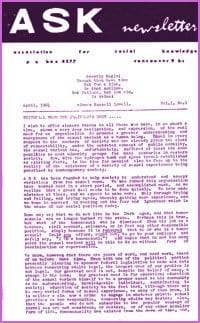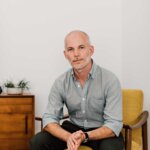“I mix with the homos,” said a US draft-dodger to Vancouver Sun reporter Bernard Wolfe in 1967. The young man explained, “When I’m called down to the induction centre, when they give me the forms to fill out, I’m going to look for the box marked ‘homosexual’ and I’m going to put a big fat check in that box.”
Another (far less prominent) newspaper would go on to reprint Wolfe’s story, as part of a queer special on Armed Forces Day. Typed, photocopied, and illustrated with crude felt-pen decorations, the ASK newsletter was first distributed in April 1964. A mimeograph and the use of a lesbian couple’s nifty new electric typewriter were their mode of production.
“There were no gay-friendly businesses where it made sense to distribute the newsletter,” remembers Douglas Sanders, former ASK president and editor. “The main bars at that point were the Montreal Club, the New Fountain pub and the Vanport Hotel pub-all in or close to skid road.”
From this beginning, 40 years ago, queer media in Vancouver was populated by a feisty bunch. And it’s a good thing fags weren’t allowed to join the military. Our warriors were needed on the home front-fighting our battles on our own battlefield.
ASK (the Association for Social Knowledge) bore a bizarrely vague name, a timid, dare we say stuck-up tone, and a heart of gold. It also happened to be in the forefront of queer media in Canada-first published in July 1964, it was the second gay periodical in Canada (the first was Gay magazine, first published in March 1964 in Toronto).
“When ASK started,” relays Sanders from Thailand, where he moved after retiring from his UBC law professorship, “the model was clearly the Mattachine Society in San Francisco.” ASK swapped newsletters with the Mattachine and “dutifully sent copies to the Institute of Sex Research in Indiana, Kinsey’s operation.”
From its humble beginnings-75 copies was the initial circulation-ASK employed seemingly arcane terms (“sexual variant,” “homophile,” and “invert”) to self-describe and ran initial-only bylines. Its members dreamed of an ASK Community Centre-eventually opened (at 1929 Kingsway) on New Year’s Eve, 1966. There, they organized BYOB dances, and built up their membership to 150. It was Canada’s first gay community centre.
The ASK newsletter called its humble readership to arms, insisting on letters to local MPs over the legalization of homosexuality. They built Vancouver’s first gay literary resource-a small collection of books for borrowing, cobbled together from donations.
Further monies were collected from dollar parties. An Amsterdam organization, COC (founded in 1946), had proven that serious gay liberation could be funded by serious gay clubbing. Sanders, when interviewed for the Tides of Men oral history project, noted “the COC’s economic base was a large disco in Amsterdam, which funded all their educational and counselling activities. This was a revelation to us.”
Perhaps ASK’s mere existence was more revelatory than anything; it was, after all, Canada’s original “homophile” organization. Its newsletter-confused at times, naïve, but always run-through with urgency and sincerity-is remarkable as an early preserve for long-forgotten battles once fought for us.
ASK’s struggle lasted 30 issues; they ran their farewell February 1968.
The group’s political work was, ultimately, personal as well. “Gab ‘N Java” sessions, held at the mysteriously titled “House,” was a coffee- and brandy-driven discussion group, founded by the ASK society, to promote a queer politic-but, no doubt, to promote hook-ups as well. Prospective members were brought to “The House” by older members, but the address and time-secretive as “La Resistance” stratagems-were code-ridden, and not to be published.
There is no commemorative plaque for the fight these early gay journalists fought. They melted away, after four fitful years of monthly publication. Amendments to the criminal code, legalizing homosexuality for the first time, would come into effect months after ASK disbanded in 1969.
* The ASK newsletter is archived at the Vancouver Public Library’s Central Branch and the Provincial Archives.


 Why you can trust Xtra
Why you can trust Xtra


